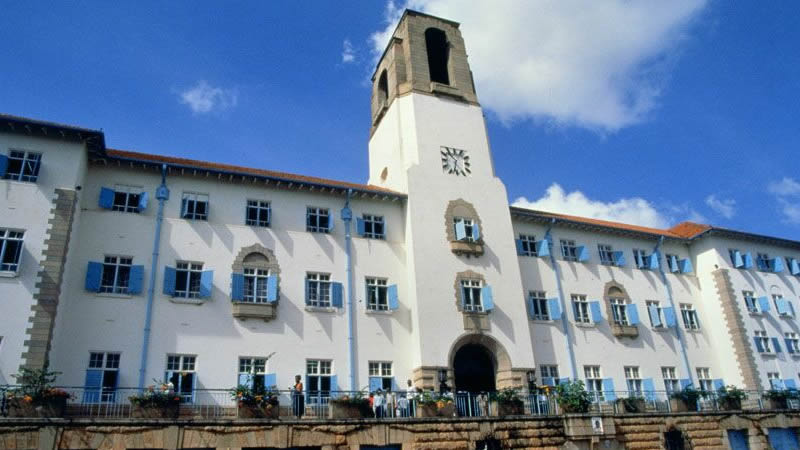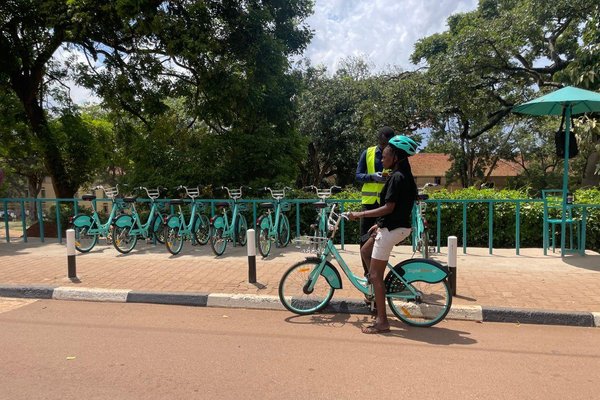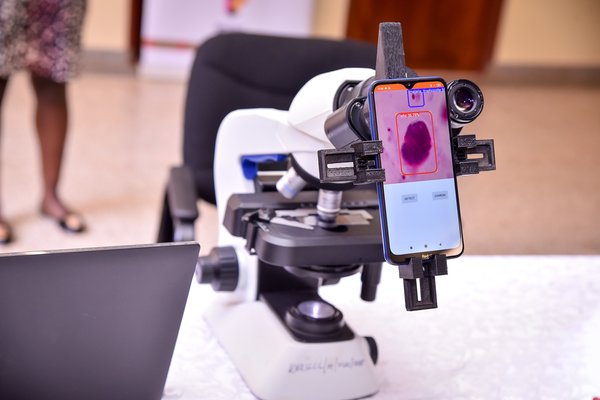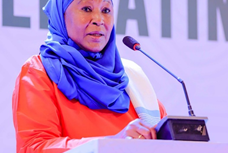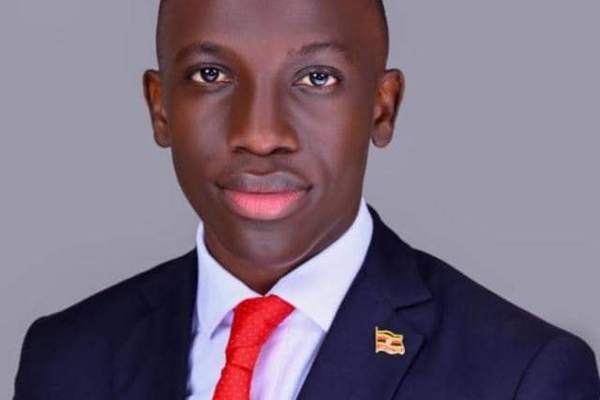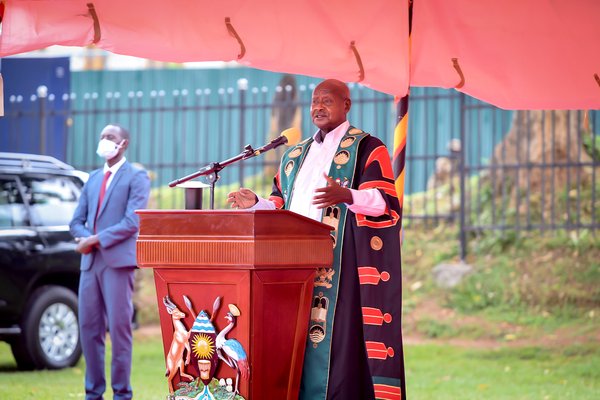The Directorate of Research and Graduate Training (DRGT) director, Prof. Edward Bbale, says Makerere University is pursuing a research-led agenda, which is not a “mere argument on the streets of Makerere, but written in our strategic plan”.
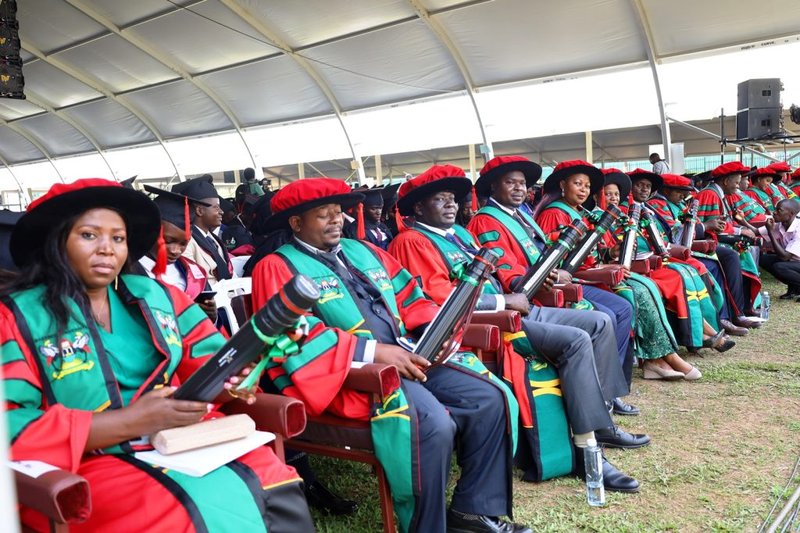
College of Computing and Information Sciences PhD-Graduates at Makerere's 73rd-Graduation
“The strategic plan has put in place building blocks for the research-led agenda to be realized, and one of the key building blocks is increased graduate enrolment. We aspire to have 30% of our students being graduate students,” Prof Bbale said, adding, “The University is much interested in having more doctoral students and postdoctoral students given their capacity to create knowledge.”
He noted that graduate students especially at the PhD and postdoctoral levels are prolific in terms of knowledge production, which can aid in championing innovations destined to impact the communities through adoption and adaptation.
Prof. Bbale noted that the research-led agenda cannot be realized without strengthening graduate training through increased enrollment, especially at doctoral and postdoctoral levels.
“As we speak, we have around 12% graduate students, meaning that we are even not yet half-way the journey. This means that we need to establish the main constraints to graduate students’ enrolment and completion and mitigate them,” he said.
According to Prof. Bbale, out of the 30% target graduate students, 10% should be international students. He revealed that currently, only 2% of graduate students are international students.
In a bid to realize the research-led agenda, Makerere University has established research entities as centers of excellence to leverage large scale multidisciplinary and multi-institutional research activities.
According to Prof. Bbale, the PhD sponsorship initiative will assist to create think tanks who will champion innovations.
PhD Curriculum
The new PhD curriculum has been proposed in which all schools will be advised to develop their PhDs by research into a curriculum document spelling out the milestones that PhD candidates must achieve, bound by time.
“We are not saying that PhDs by research should stop, but PhDs by coursework and dissertation are much more encouraged as the “student is grounded in the theoretical aspect of the subject in which they are going to do research,” he said, noting that going back to class extends the student’s “frontier of knowledge in their particular area of study”.
He added that with PhD by coursework, the milestones that must be achieved by a particular student are clear as targets are clearly spelt out.
Motive to fund PhD students
Prof. Bbale said one of the challenges to graduate training, especially PhDs, is funding, which causes several students to drop out.
“Many of our graduates are self-sponsored and fall out of the programme on the way as they try to look for money. Consequently, they fail or don’t complete in time,” he said, noting that “where we have an opportunity to have our graduate students sponsored, completion rates have been very impressive, as candidates are recruited into a programme and have nothing to worry about, but to fulfill the programme requirements, which has enabled many to graduate on time.”
Despite engaging other donor communities, the university is engaging the government to prioritize graduate training and offer scholarships or any other funding modalities, such as a loan scheme and direct government scholarship to some priority programmes.
“Government has done great on sponsoring undergraduate students. However, a study from the World Bank shows that the return on investment in education is highest at the graduate level,” Prof. Bbale said.
Mak-RIF funding for PhD students
Prof. Bbale commended the ingenuity of the university for allocating part of the Makerere Research and Innovation Fund (Mak-RIF) funding to PhD students. “As I speak, so many PhD students have benefited. We think that their research activities are going to be much faster because of this facilitation. Instead of someone looking for resources to undertake fieldwork, data collection and other activities, RIF has given them something to take them,” he said.
“In the meantime, the sponsorship only covers research projects, and over 100 PhD students have benefited. We want to ensure that the fund also covers the tuition,” he added.
The PhD research grants fall under the Needs Responsive Track Category of Mak-RIF awards, following a recommendation by the university management and the Vice Chancellor, with approval by the Mak-RIF Grants Management Committee.
During a meeting with Makerere University management, it was highlighted that PhD research support was one of the persisting gaps in the university. Given that PhD study is strongly research-related, Mak-RIF was mandated to utilize their funds for PhD research sponsorship.
Based on this, Mak-RIF embarked on supporting PhD research under the Track 2 PhD Research and Innovations grants taking care of only the research aspects of PhD training and not tuition or other aspects that are non-research related.
PhD Sponsorship timeframe and requirements
Mak-RIF research and innovations projects are funded for a period of one year. The award period for the current projects under the RIF 4, Track 2 PhD Research and Innovations started on 20th February, 2023 and will end on 19th February, 2024. During this period, awardees are required to requisition for funds, implement all planned activities, account for funds received, submit quarterly reports and submit a final report for their projects.
All faculties are given priority. This includes all the 10 colleges and other administrative units in the university. The difference is that applicants from the humanities-based colleges are awarded up to UGX 25 million (approx. $8,000) for research while the applicants from the science-based colleges are awarded up to UGX 35 million (approx. $10,000). Science-based research usually requires purchase or hire of equipment, purchase of laboratory supplies and services and long-term monitoring, which is more expensive in the long run.
Selection criteria of PhD students for sponsorship
The criteria for the selection of the sponsored students includes the following.
- Registration/ admission with Makerere University: This is for both provisionally and fully admitted students. All those who are registered applicants qualify to be awarded. The fund is limited to students registered under Makerere University since the aim is to increase the number of PhD graduates and research output from Makerere University.
- Approval of the research proposal by the doctoral committee/research committee at the specific college: Applicants are required to have received approval by their doctoral committees to conduct research.
- A recommendation for funding by the specific college based on students’ progress: Mak-RIF conducts due diligence at the college to understand the status of progress and receive an overall recommendation for funding of each applicant.
- Alignment to Global and National Development Priorities: Applicants are required to submit research projects that are aligned to the Mak-RIF research agenda. This research agenda was developed in consultation with stakeholders in government ministries and agencies, private organizations and development partners. Thus all research should align with the National Development Plan III, Vision 2040, the Sustainable Development Goals and the dynamic country priorities.
Number of students sponsored per year
An average of 100 projects is expected to be funded under the Track 2, PhD Research and Innovations cohort. However, this is dependent on the availability of funds, and quality of applications received.
The PhD Research and Innovations projects have only been funded for four months (February 20th to June 2023), and therefore, it is still early to have success registered. However, the university looks forward to supporting all the awarded projects to completion and publishing of findings.
Some of the challenges encountered so far include, delayed release of funds to the research projects - this affects timely implementation of project activities. Mak-RIF is supporting researchers to submit requests for funds early enough to reduce the turnaround time between submission of requests and receipt of funds.
In addition, the need is big but at the moment, Mak-RIF can only support a handful largely due to the available resource envelope. In this regard, Mak-RIF has continued with efforts to leverage additional funding. Mak-RIF also encourages awardees to continue casting their nets far and wide in an effort to attract additional funding for faculty, students and administrators to carry out research and innovation.
The Government of the Republic of Uganda has been helpful in providing funds to the university to a tune of approximately $8.1 million per financial year (for the last 4 financial years). This shows the importance that is attached to research and innovation as a catalyst for national development.
The university, however, calls upon other donors including the private sector to join in the efforts to support and fund research and innovation in higher education institutions in a bid to realize Uganda’s development efforts.
Compiled by John Tatyamisa, Gloria Naggayi, Mak-RIF Research Support Officer, Juliet Nabirye, Mak-RIF Monitoring and Evaluation Officer, and Harriet Adong, Mak-RIF Communications Officer
Related News
![]() Please join hands with the Makerere University Endowment Fund as it works towards attracting & retaining the best faculty, providing scholarships, and investing in cutting-edge research and technology.
Please join hands with the Makerere University Endowment Fund as it works towards attracting & retaining the best faculty, providing scholarships, and investing in cutting-edge research and technology.
